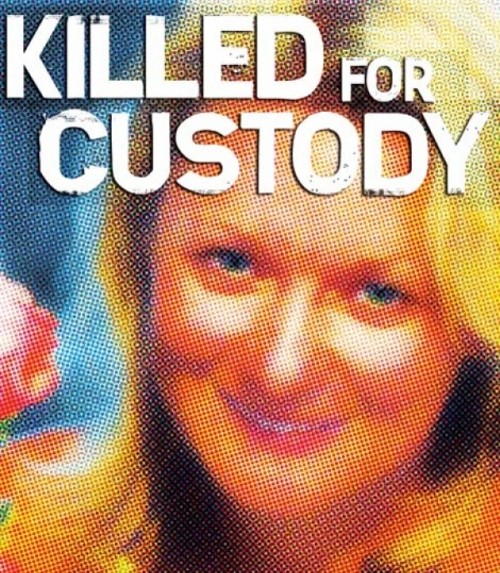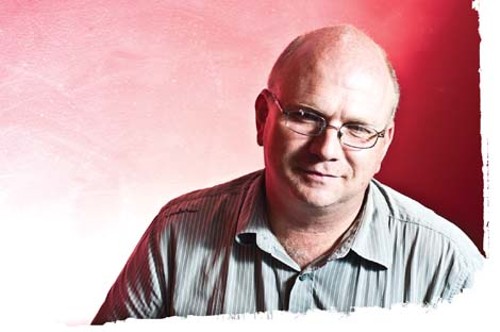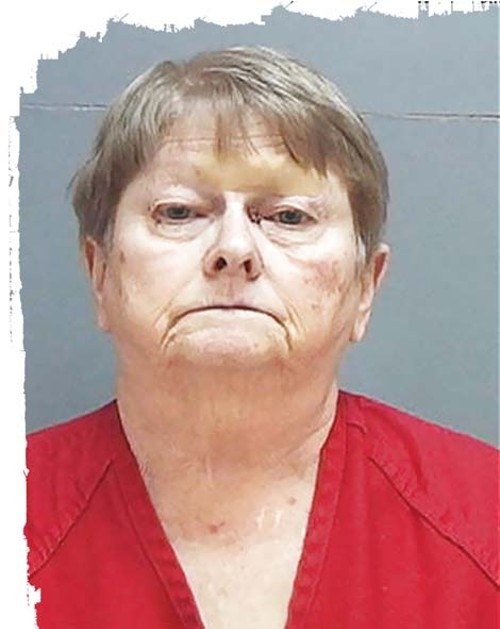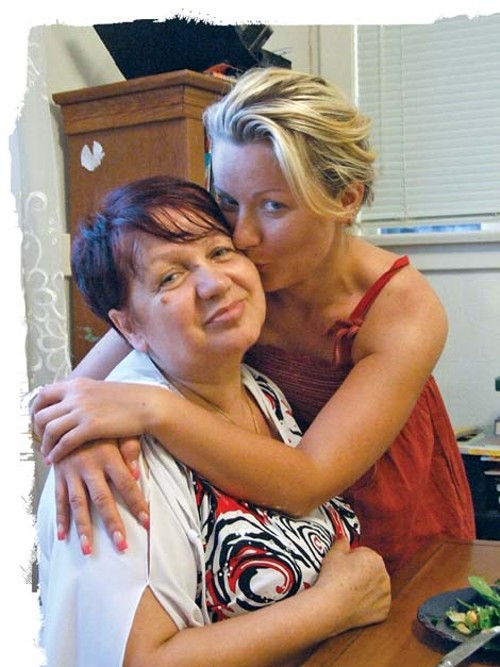Rod Hernandez heard his life shatter. On the afternoon of Jan. 29, 2010, his fiancee Tetyana “Tanya” Nikitina’s 9-year-old son was watching TV in the living room while Hernandez cooked pork chops for dinner. He was getting ready to pick up Nikitina’s 7-year-old daughter from school.
Phoning him at 3:37 p.m., Nikitina was walking to her car. She sat behind the steering wheel and started the engine while speaking words brimming with happiness. It was Friday, she was headed home from an employee-training session at Salt Lake Community Action Program Head Start, at 336 E. 3900 South. She repeatedly told Hernandez how much she loved him. Suddenly, she exclaimed, “Oh, my God!” Hernandez heard the phone fall. He waited four minutes without hearing her voice. Telling Nikitina’s son he would be right back and holding the phone to his ear, he rushed to the preschool where Nikitina taught. Halfway there, he heard sirens and wondered if another car had hit Nikitina’s as she left the school.
As he walked past yellow police tape, Hernandez says an officer told him, “You’re in a crime scene.” Since Nikitina had borrowed Hernandez’s car that day, he told police who he was and that his fiancee may have been in an accident driving his car. The officer told Hernandez, “Your fiancee has been shot. An ambulance took her. We will take you to where she is.”
Hernandez immediately called Nikitina’s ex-husband, Dale Jankowski (pictured at left), to tell him Nikitina had been shot and to ask him to pick up the children. “He said, ‘Oh, my God, bye!’” Hernandez says.
At the hospital, Hernandez waited for answers until a policeman told him that 34-year-old Nikitina had died. The medical examiner would later show the cause of death was four gunshot wounds to the head.
“A woman did this,” the officer told Hernandez. Then Hernandez heard the killer’s name: Mary Nance Hanson. Hernandez was stunned to learn that Nikitina’s former mother-in-law had murdered her.
It had been 11 tumultuous years since Jankowski, Hanson’s son, and Nikitina (pictured at left) had married, had two children together, divorced and then attempted to live separate lives. While a divorce decree was issued in 2006, court documents show that hot-button issues of custody and child support continued to fester between the couple. Nikitina had sought out two protective orders in the intervening years and reportedly feared for her life.
“Ultimately, we all know why this happened,” Hernandez says. “If Dale had treated Tanya with respect, realized that his children love her as much they love him and that anything that happens to her also happens to them, there wouldn’t have been this outcome. If that conflict hadn’t been there, Tanya would still be alive.”
Jankowski, 45, calmly insists he had nothing to do with the murder. He says that he felt a similar tremendous shock after Hernandez called him to pick up the children, phoning later to let him know that Nikitina was dead. “My heart was breaking for my kids. I knew that they needed their mother and father, and now they weren’t going to have their mother in their life.”
He remembers Hernandez telling him that his mother was the killer. “I literally became incapacitated and couldn’t think or do anything. I kind of went into zombie mode. It was the most difficult drive I’ve ever had, having to take the kids back to the house. The worst part was, in the same day, I lost my mom, and my kids lost their mom and their grandmother.”
Mommy Dearest.
Just who their grandmother is and why she shot Nikitina may have to remain a mystery.
According to Jankowski, prior to the attack, his mother had parked her car at his workplace, a mortgage title company. He says she had just become uncomfortable driving. When they talked earlier that day and she mentioned she was concerned about her car, “I thought she was going downtown to a doctor’s or dentist’s appointment.”
Instead, police say, Hanson (pictured at right) walked about a mile to the preschool where Nikitina worked as an assistant teacher. As Nikitina got in her car, witnesses say, Hanson approached and fired several rounds from a .38-caliber revolver at her former daughter-in-law, then allegedly reloaded, opened the car door and fired several more rounds. She then dialed 911, reported her crime and waited for police to come. When asked why she shot Nikitina, Hanson reportedly told the 911 operator, “I don’t know, and that’s all I’m going to say.”
While news media reported that Hanson held a concealed-weapon permit, Jankowski maintains he never knew she had a gun.
The 71-year-old Taylorsville woman was booked into jail and charged with murder. She pleaded guilty in 3rd District Court on Aug. 18. In a letter that Hanson wrote to Judge William Barrett in April, she explained why she would be pleading guilty: “My physical health is deteriorating rapidly, and I do not believe it would be in the best interests of taxpayers or of myself to pursue a trial.”
In the courtroom, Hanson told the judge, “I would like to be sent forthwith to the prison, and I would like to request death by lethal injection.”
When told her case was not eligible for the death penalty, Hanson reportedly told the judge: “Well, then, I guess I didn’t do a good enough job.”
Such a remark can only make the incredulous public ask: How is Hanson’s not a death-penalty case? Alicia Cook, the deputy district attorney who prosecuted the case, explains the death penalty can only be sought if certain statutory elements, or aggravators, are present. Examples of aggravators include if the defendant killed more than one person, if the defendant murdered while committing other offenses such as a sexual assault, or if the defendant used a device, such as a bomb. “That is what we are limited to,” says Cook. “The statute very clearly lays out for us what needs to present to file a death-penalty case.
In her 10 years as a prosecutor, though, Cook has never experienced a defendant requesting the death penalty. “This is a baffling and sad case, in which two children lost their mother, a fiance has lost the person he was going to spend his life with and a sister lost her only sibling. It’s a sad case that we took very seriously. There was no plea bargain. The defendant pleaded to exactly what she was charged with, and the only possible sentence for the defendant is prison [15 years to life].” Hanson’s sentencing hearing is scheduled for Oct. 8 Oct. 22 [Hanson's defense asked for and was granted a continuance].
Jankowski says that, on the night of the murder, police took him in to question him for an hour and a half while other officers simultaneously searched his home and computer “for anything that would link what my mom had just done with me. They concluded that I had nothing to do with it in any way, shape or form.”
Growing up, Jankowski says he doesn’t recall his mom having violent tendencies. He remembers about “as normal a childhood as possible in a single-parent family.” After his parents split, his mom worked a variety of jobs—“not particularly professional-type jobs.” She worked at BYU Food Services and went back to school to study drafting. His mom took him and his siblings fossil hunting and camping. He says she “parented out of the ’60s, when spankings were OK,” but it didn’t happen that often.
Recently, his mother was diagnosed with congestive heart failure, and he realized she might not be around much longer. He wanted to build memories with her and the children.
Most of his mother’s grandchildren are older—many are grown—and spending time with his son and daughter gave Hanson a renewed opportunity to grandparent younger children, after the others “had their own lives.”
While his mother expressed anger at the custody situation with his ex-wife, Jankowski says she never hinted she planned to kill Nikitina. “I wish there had been something that would have indicated a different outcome,” he laments. “It was so tragic that the only thing she could think to do was to take away the kids’ mother.”
Hanson declined to be interviewed by City Weekly.
Fathers Have Rights.
The couple met, Jankowski says, when a friend of his traveled to the Ukraine and married Nikitina’s sister. His friend introduced the pair, and Nikitina emigrated to the States in 1998. They married a year later and went on to have two children together.
In the beginning, Jankowski said his mother liked Nikitina. “They had their moments, but so long as they had some space in their relationship, they were able to get along and be sociable.”
By 2005, Nikitina had filed for divorce. “It was Tanya’s decision to move out,” Jankowski said, “Her comment to me was, ‘I just want to try it on my own.’ There was no real reason—no infidelity, abuse, drugs or gambling.”
Post-divorce, Nikitina’s life was bleak, explains her sister, Anna, who lives in Florida and asked that her last name not be used in this story. “She kept getting small jobs, temporary ones, because of her two small kids. She went to electrician school and got an electrician license. She was trying so hard, but it was almost impossible.” While she holds a master’s degree in education from the Ukraine, she was underemployed in the United States. Anna says she often sent money to help Nikitina, who initially survived by living in public housing. “It was always a struggle,” she said, “and I hated to see her kids suffer—they are innocent children.”
Yet Anna adds that Nikitina was rising above her difficult situation. “After two years, she blossomed like a flower, from a person who was financially struggling and lonely to a person who was confident, had a good job and was respected by the community. She moved out of public housing and was paying rent on her own little house.”
She adds that while Jankowski initially received partial custody, and Nikitina “received very little child support,” after the judge saw what she had accomplished, he gave her complete physical custody along with more child support.
Jankowski agrees the conflict over custody was significant. He says he and Nikitina originally agreed to a 50-50 custody arrangement, where each would have the children on alternate weeks. Hernandez thinks that, for Jankowski, the 50-50 arrangement meant each parent would pay half of the children’s expenses and neither would pay child support.
On July 29, 2009, Jankowski posted a comment about the importance of fathers’ rights in custody on MeetUp.com, a Website for Utah fathers’ rights. “For those who are serious about the issues that confront active fathers regarding custody and visitation in the state of Utah, there needs to be a more active forum of truly interested individuals. Action needs to be taken to protect the position fathers hold within their children’s lives,” Jankowski writes. “We cannot afford to be marginalized by mothers with their own agendas, attorneys seeking personal gain over the best interest of the children, and state legislators who are out of touch with the consequences of the laws that they pass. Let’s get this organized.”
He says that his strong feelings about custody arose from growing up in a single-parent home where his father wasn’t active in his life because his mother had full custody. Jankowski grew up the youngest of six children born in a seven and a half year period. He doesn’t really remember his parents being together. “For a little while, bits and pieces, then, it was either my mom or my dad [taking care of me].” He recalls his dad, who now lives in Wisconsin, being active in his life between 1967 and 1968 and in 1971.
“Typically, back then, the courts gave the mother full custody, and the father received some form of visitation,” Jankowski said. “My dad was more than willing to make sure us kids were taken care of [financially], but he was not able to be, and wasn’t considered to be, an equal participant. A lot of the fathers in Utah are relegated to the position of a visitor, having their children one night a week and so many days on the weekend. I didn’t want someone taking away my opportunity to be responsible for my children.”
He believes Nikitina changed her mind about their original 50-50 agreement and eventually sought and received full custody. “Through whatever channels were available at the time—whether it was the legal system or attorney—the original perception changed.”
Jankowski feels many fathers share his financial frustrations with typical custody arrangements. “When you are given strictly visitation and another party has full custody, yet you are required to pay the bill for the majority of those expenses and also deprived of the opportunity to be actively involved, it is the worst of both worlds,” he says.
Who Has Control.
In fall 2005, the couple went through hearings and mediation. “Nothing came of the mediation,” says Jankowski. “We also ‘bifurcated’ to the divorce—indicating that while we were divorced, we understood that some matters were still disputed. I had no problems with paying child support to support the welfare of my kids. ... I was devastated by the fact that I was relegated to the visitor position. ... If my ex wife married someone whose ideas I didn’t agree with, he would have more influence with my child than I did,” Jankowski said.
Within their conflict, Jankowski says that he and Nikitina each called the police on several occasions. He says that the first of two protective orders she filed was dismissed. On another occasion, he says he called her from the rec-center parking lot where they planned to exchange the children at 1:45 p.m. After several calls with no response, he says Nikitina answered, saying her car was not working. He then drove to her apartment and arrived at 2:03 p.m. He says she accused him of being late.
“I lost my temper after having used a bad name I shouldn’t have used,” Jankowski said. “She held out a recorder and said, ‘I have been recording you.’ Attorneys don’t warn you about these entrapment things. She took two steps backward and fell on the bed in her living room. On the tape there was this false, silly-sounding scream. Her story to the police was that I pushed her.”
He says that while he didn’t touch Nikitina, police took photos of red spots on her stomach and gathered evidence. “No charges were ever filed and my ability to be a foster parent was never questioned [Jankowski was also a foster parent at the time]. The burden of proof for a protective order is so low that David Letterman got one against him when a woman said something in his monologue pertained to her.”
Nikitina also accused him of abuse and neglect, he says, to the point where the children were taken to the hospital under police escort. “There were never any findings to support her belief that there was abuse or neglect,” he says. Jankowski currently lives with both his children and two former foster sons over whom he now has guardianship.
Lori Nelson, a local domestic and family-law attorney, says that while parents believe that what they are doing is right for their children, “I don’t believe that they can fairly and completely analyze their own motives. … They are not intentionally trying to hurt their kids, but their behaviors have negative consequences on their children, which is difficult for them to see and accept.”
“Especially when there is abuse involved, custody disputes are challenging and emotionally draining,” says Keri Jones, chief program officer of the YWCA in Salt Lake City. “In our experience with domestic violence, we find that children often become a pawn, where that is the only thing an abusive partner has to control once their spouse has been removed. They will try to control the custody issues or arrangements of the children because that is all that they have left to control.”
Nelson adds that parents often will fight over joint parenting or shared time because it impacts them financially. “They will be so focused on the bottom line that, out of fear, greed or selfishness, their behaviors will have negative consequences.”
Sixteen Days.
Hernandez met Nikitina in on Easter of 2007. He was delivering Easter baskets to his brother’s apartment in the same building where Nikitina lived. “I was walking to the apartment and looking down at the Easter stuff, when I first saw these feet and shoes—and gorgeous legs. I looked up and saw Tanya, a beautiful lady wearing sunglasses and talking on a cell phone. It was love at first sight. The two kids were standing with her.”
It was a year before they agreed to date. Hernandez proposed to her on Aug. 15, 2009.
Before Nikitina moved in with him, Hernandez says she was always struggling to get by. “When she first came here, she didn’t know any English and she got odd jobs and worked at 7-Eleven,” Hernandez says. “After the divorce, her English still wasn’t the best, and she was alone, taking care of two kids with no one to help her.”
He says that all of the times Jankowski took Nikitina to court, it was because he didn’t want to pay child support. “Every time he took her back to court, his child support kept going up.” He says that Nikitina owed $16,000 in legal bills as a result of the continuing court battle.
Hernandez says that Hanson scared Nikitina, who referred to her former mother-in-law as her ex-husband’s “pit dog.” “Whenever there was a problem between Tanya and her son, he wouldn’t handle it, [Hanson] would.” Hernandez says that Hanson left messages on Nikitina’s phone, telling her the children should be with their father and that she was a terrible mother.
During his divorce, Hernandez had experienced his own custody conflict. After the custody battle relating to his two daughters ended, “My former wife grabbed her coffee and looked back at me. She said, ‘I had some people offer to kill you.’ ”
Reflecting on that situation, he says, “I imagine that the thought of killing their spouse crosses the minds of many people who are divorcing.”
About 2 1/2 weeks before her death, Nikitina “was leaning up against me while we were watching TV, and she suddenly became very upset. She said that if something happened to her, her children would go to that crazy family. I told her that was not going to happen, that we were getting married pretty soon and the children would be with me,” he says. Nikitina and Hernandez planned to marry on Valentine’s Day, 16 days after the day she was murdered.
“She had her wedding dress and had already given me my ring,” says Hernandez.
Jankowski views Hernandez as a solid and stable person and says, “It would have been a fine option for Tanya to have him around, it would have been beneficial for her and good for the kids, who still have a continuing relationship with Rod. I really do hope that the state of Utah and the entire country sees how important fathers are to children. Most fathers are not the runaway fathers and want to be there for their kids. Many are pushed out the door rather than leaving on their own.”
How To Heal.
Today, Jankowski chooses not to visit his mother “at this point in time. I don’t know what I would say or if it would be beneficial in any way.” His children drew pictures that he mailed to her. They also have many photos of both their mother and grandmother in their home.
Jankowski previously underwent therapy and both children currently visit a therapist. “They communicate to me and their therapist that they miss their mother. [My daughter] from time to time will start crying and other times say, ‘I want Mommy.’ ” He says that the children draw pictures, and he has a helium tank at home that the children use to fill balloons and attach messages to their mother.
Hernandez hopes to send his own message of hope for the future. In the ’70s, he played professionally in a band in the Las Vegas circuit. He quit playing in 1981 and has always missed it. He says that, during the time they lived together, Nikitina saw his guitars and photos of his band and asked him to play for her. “She kept bugging me about it. I told her that when we got married on Valentine’s Day, I would play for her.” To deliver on that promise, he and Nikitina’s former boss, Julie Peel, will hold a concert in Nikitina’s memory.
“In Memory of,” will be held 1-9 p.m. on Saturday, Oct. 16 at the Utah Cultural Celebration Center, 1355 W. 3100 South in West Valley City. Proceeds will benefit Nikitina’s surviving children and other community services offering victim support. The public is invited to send photos to be included in a memory wall to honor those who have lost their lives to a violent crime (Visit InMemoryOfEvent.com). Featured will be the band Hot Sauce—a group Hernandez and other musicians recently assembled—as well as other live bands, cultural dancers, ethnic food, a citywide motorcycle ride, speakers and representatives from grief-support groups. A candlelight procession honoring victims will conclude the event.
“When this happened to me, for the first three months, I didn’t want to live. I was drunk every day,” Hernandez says. “I didn’t know about victim-support groups. They sought me out and helped me, and if it wasn’t for them, I wouldn’t have survived.”
Today, Hernandez is the link between Nikitina’s sister, her parents—who currently live in the Ukraine but plan to relocate to the United States—and her children (see his blog here). While the children now live with their father, Hernandez continues to see them at their soccer games and on outings. “When I visit the kids, it’s hard on me because I want to talk about Tanya, and the kids say they aren’t supposed to talk about her.”
On a recent roller-skating outing at Hollywood Connections, Nikitina’s son said he wanted to go home. “When I said, ‘We’ll go home in a minute,’ he said, ‘I want to go to our home.’” Hernandez drove the children back to the house he shared with Nikitina. The boy “went to his bedroom, put all his toys around him and read a book. I missed my home the way it used to be with the music on and Tanya dancing around the house.”
While Hernandez doesn’t know what lies ahead, he needs to be prepared for life after the Oct. 16 concert, when he predicts he will experience a big letdown. “Every day, when I wake up, I think about Tanya. I wake up in the middle of the night thinking about her. Every day, I miss her so much. I want to dream about her, and I can’t. I hope to be able to dream about her someday, and when I can, she will be alive again.”
More by Carolyn Campbell
-
Dating counselors help singles move past relationship hiccups and get to the next date.
Looking for Love
- Feb 7, 2024
-
How DNA experts and law enforcement uncover hidden identities.
Written in Bone
- Jan 24, 2024
-
City Weekly's year-end guide to getting through the holidays and closing out those Christmas lists.
Gift Guide 2023
- Dec 6, 2023
- More »
Latest in Cover Story
Readers also liked…
-
Forget the family pedigree—Robert F. Kennedy Jr should not be the next president of the United States
Trojan Horse
- Jun 21, 2023
-
Women decry harassment and toxic culture at St. George auto dealership
Men at Work
- Oct 11, 2023










